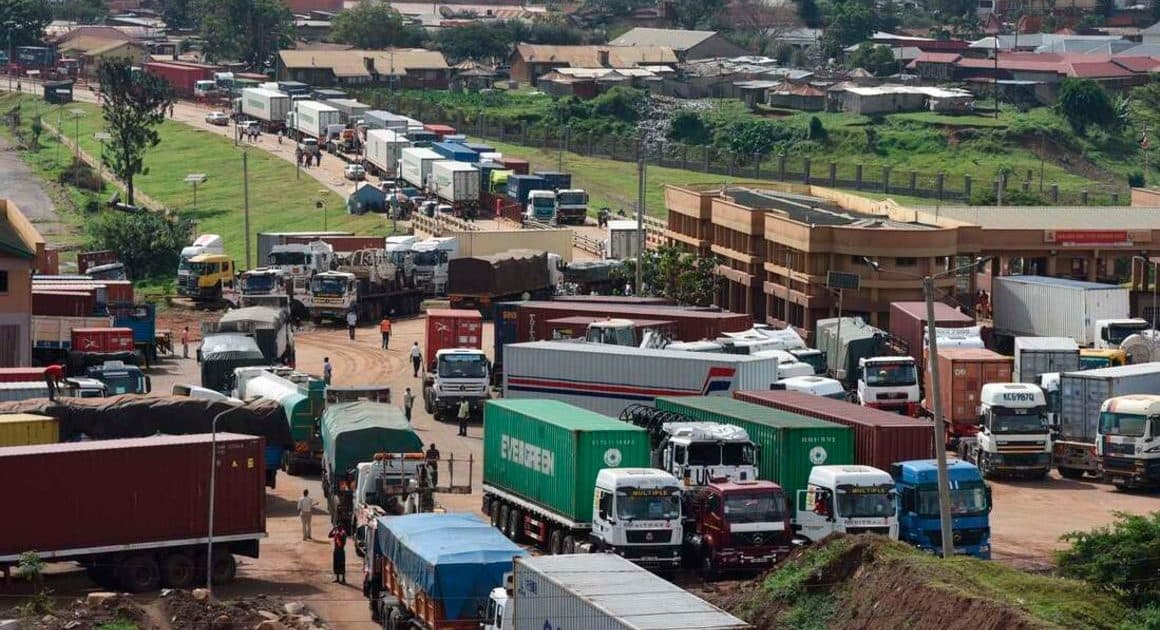We're loading the full news article for you. This includes the article content, images, author information, and related articles.
Inefficiencies at the Malaba One-Stop Border Post are causing significant delays and increased operating costs for truck drivers, hindering trade between Kenya and Uganda.

Truck drivers operating along the vital Kenya-Uganda border in Busia County are urgently calling on the Kenyan government to address severe inefficiencies at the Malaba One-Stop Border Post (OSBP). They report that persistent delays, inadequate infrastructure, and frequent technical malfunctions are significantly slowing down the movement of goods and escalating operational costs, thereby impeding trade between the two East African nations.
These concerns were brought to the forefront following a visit to the Malaba OSBP on Tuesday, October 7, 2025, by the Senate Committee on Trade, Industrialization and Tourism. The committee, led by Chairperson Senator Issa Boy Juma, was conducting oversight as part of the ongoing Senate Mashinani sessions in Busia County.
The Malaba OSBP is a critical artery for East African trade, handling a substantial volume of cargo and an estimated 1,000 travellers daily, with traffic increasing by 5% annually. Despite its importance, the facility's customs yard can only accommodate approximately 100 trucks at a time, contributing to significant congestion. Challenges at the Malaba OSBP are not new; a 2018 study highlighted issues such as limited operating hours, inadequate staff skills, system downtime, and insufficient office space.
Efforts to streamline border operations have been ongoing. The East African Community (EAC) established One-Stop Border Posts to reduce delays and improve efficiency through harmonised customs procedures and single-window clearing systems. However, implementation has faced hurdles, including inadequate infrastructure and coordination issues between partner states.
Truck drivers have specifically pointed to inefficient scanning procedures by the Kenya Revenue Authority (KRA), which can cause delays of up to 48 hours. They also cited frequent system breakdowns, power outages, and scanner failures on the Ugandan side, particularly during rainy seasons. Additional concerns include the high cost of tax seals and poor coordination between Kenyan and Ugandan customs agencies. Drivers report that multiple checkpoints and unnecessary documentation processes, especially on the Ugandan side, worsen turnaround times and increase business costs.
During their visit, the Senate committee observed that the outbound road at Malaba remains incomplete, forcing both incoming and outgoing trucks to share a single lane. Busia Senator Okiya Omtatah also highlighted idle trailer park infrastructure at Mundika and Malaba, which, if operational, could generate up to KSh 720 million annually and help decongest the border.
The ongoing inefficiencies at Malaba pose significant risks to regional trade and economic integration within the East African Community. Delays translate directly into increased operational costs for transporters, which are often passed on to consumers, potentially raising the cost of goods. Furthermore, prolonged border congestion can deter investment and undermine Kenya's position as a regional trade hub. The challenges also contribute to unrecorded cross-border trade, which can lead to revenue losses for governments and create an environment for illicit activities.
While the problems are well-documented, specific timelines and funding allocations for comprehensive upgrades and policy reforms at the Malaba OSBP remain unclear. The coordination mechanisms between Kenyan and Ugandan authorities to address shared infrastructure and procedural issues also require further clarity. Previous initiatives by KRA to integrate government agencies and speed up clearance have been launched, but their sustained impact on reducing snarl-ups is still being assessed.
The Senate Committee on Trade, Industrialization and Tourism has called for an urgent expansion of the Malaba OSBP, improvement of power supply, and recruitment of additional customs and security personnel to ease congestion. They also recommended redesigning entry and exit lanes to facilitate seamless truck movement. The committee's findings and recommendations are expected to inform parliamentary debate and policy execution, with stakeholders awaiting clear timelines and commitments from the government.
All eyes will be on the government's response to the Senate committee's recommendations and the implementation of concrete measures to address the long-standing issues at the Malaba OSBP. The effectiveness of any new initiatives will be crucial for improving trade facilitation, reducing costs for businesses, and strengthening regional economic ties between Kenya and Uganda. Stakeholders will be looking for clear action plans, measurable targets, and improved inter-agency coordination to ensure a more efficient border operation.
Keep the conversation in one place—threads here stay linked to the story and in the forums.
Sign in to start a discussion
Start a conversation about this story and keep it linked here.
Other hot threads
E-sports and Gaming Community in Kenya
Active 9 months ago
The Role of Technology in Modern Agriculture (AgriTech)
Active 9 months ago
Popular Recreational Activities Across Counties
Active 9 months ago
Investing in Youth Sports Development Programs
Active 9 months ago